|
|
|
Sort Order |
|
|
|
Items / Page
|
|
|
|
|
|
|
| Srl | Item |
| 1 |
ID:
165225
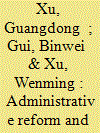

|
|
|
|
|
| Summary/Abstract |
China's economic miracle has been achieved at considerable environmental cost. To fight against environmental pollution more effectively, the Chinese government established the Ministry of Environmental Protection (MEP) in 2008. This study investigates the stock market reaction to this event and finds that, on average, listed firms in polluting industries experienced a statistically and economically significant negative abnormal return on the event date, which implies that the compliance costs of these polluting firms are expected to increase. In addition, this study finds that enterprises with different ownership styles and different political influence experienced different price reactions during the event window. More specifically, state-owned enterprises (SOEs) in general experienced a less negative abnormal return over different event windows, and provincial SOEs perform much better than central SOEs and sub-provincial SOEs.
|
|
|
|
|
|
|
|
|
|
|
|
|
|
|
|
| 2 |
ID:
137525
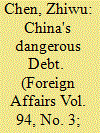

|
|
|
|
|
| Summary/Abstract |
In September 2008, when Chinese President Hu Jintao got word that Lehman Brothers, then the fourth-largest U.S. investment bank, was on the verge of bankruptcy, he was traveling by van along the bumpy roads of Shaanxi Province. Surrounded by policy advisers and members of the Politburo, Hu asked them how China should respond to the inevitable spillover. According to one participant in the discussion, the group reached a clear consensus by the trip’s end: China would need to launch a massive stimulus program. And it could trust only state-owned enterprises (SOEs), rather than private firms, to carry it out.
|
|
|
|
|
|
|
|
|
|
|
|
|
|
|
|
| 3 |
ID:
137533
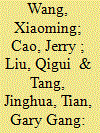

|
|
|
|
|
| Summary/Abstract |
This paper examines the relationship between ownership structures and IPO long-run performance of non-SOEs in China. Although non-SOEs underperform the market in general after IPO but the poor performance is mainly caused by the IPOs with ownership control wedge. Non-SOEs with one share one vote structure outperform those with control-ownership wedge by 30% for three years post-IPO performance in adjusted buy-and-hold returns. Non-SOEs with control-ownership wedge have higher frequency of undertaking value-destroying related party transactions. These findings suggest that non-SOEs need to improve corporate governance such as disproportionate ownership structure to better safeguard the interest of long-run shareholders.
|
|
|
|
|
|
|
|
|
|
|
|
|
|
|
|
| 4 |
ID:
185614
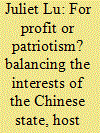

|
|
|
|
|
| Summary/Abstract |
Chinese state firms are expected not only to profit but also to serve state interests. But the Chinese state is fragmented: border provinces are taking on an expanded role in China's global expansion and a broad range of firm activities could be defined as patriotic contributions. Through the case of Yunnan State Farms (YSF), a province-level state-owned enterprise, this article explores how state firms interpret and navigate multiple state interests while also pursuing profit. The firm's ability to profit depends on balancing the demands and support of different Chinese state actors while depicting itself as a development partner to the Lao state and a contributor to Sino-Lao diplomatic relations and border region stability. This case thus shows that, instead of YSF's behaviour being directed by the state, the firm exercises considerable latitude in defining its contributions to state interests through the expansion of rubber production as a driver of development.
|
|
|
|
|
|
|
|
|
|
|
|
|
|
|
|
| 5 |
ID:
120191
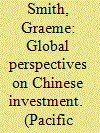

|
|
|
|
|
| Publication |
2013.
|
| Summary/Abstract |
This introduction outlines some of the more influential academic studies on Chinese investment abroad, including the existing quantitative literature on Chinese outbound direct investment (ODI). It introduces a case study from Australia involving state-owned mining conglomerate Chinalco, and the fallout from its failed bid for a share in Rio Tinto. The study confounds many of stereotypes about the behaviour of the Chinese central state. We go on to suggest frameworks developed in the study of China's domestic political economy that may be useful in analyzing the behaviour of Chinese state and non-state actors abroad. Such frameworks can help in understanding how Chinese investors develop informal institutions, and make use of existing formal institutions, to "get things done" in unfamiliar investment environments.
|
|
|
|
|
|
|
|
|
|
|
|
|
|
|
|
| 6 |
ID:
172561
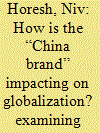

|
|
|
|
|
| Summary/Abstract |
This article is aimed at better understanding China's Overseas Foreign Direct Investment (OFDI) choices through a post-War Japanese historical perspective. It will focus in the main on OFDI as a marker of an advanced stage of the East Asian ‘developmental state’ formula, wherein the ‘China Brand’ takes shape. The transition process from heavy-industry and low-value added goods to frontier-technology manufacturing with global brand recognition will be placed under scrutiny. A Japanese perspective is called for, as much of the theory in the field of international business to do with OFDI and the growth of multinational corporations (MNCs) is currently primarily derived from a Western developed-economy setting, and hence does not seek to offer much in the way of predictive insight about all-important yet middle-income China, as it proceeds towards becoming the largest economy on the planet. The article surveys the historical trajectory of Chinese OFDI, underling its correlation with inbound foreign investment into China; it then offers a comparative view of Japanese OFDI in the pre- and post-War era. It then assesses Chinese brand strength in the electrical appliance, automobile, and IT areas. Finally, it offers a prognosis as to the future direction of Chinese OFDI, and how it might affect the contours of globalization as well as Sino-American rivalries.
|
|
|
|
|
|
|
|
|
|
|
|
|
|
|
|
| 7 |
ID:
068390


|
|
|
| 8 |
ID:
174071


|
|
|
|
|
| Summary/Abstract |
Chinese state-owned enterprises (SOEs) have become an important source of foreign direct investment (FDI) in resource-rich countries. Their expansion has stirred a debate in the Western hemisphere about the ability of SOEs to challenge liberal economic practices and to alter domestic governance in the countries where they invest. This paper contributes to this debate by examining the case of Chinese SOE investment in the Canadian hydrocarbon sector. It uses insights from the literature on the world order, international business, and international relations to examine the impact of SOE investment on a host country in the Western hemisphere. As I argue, the Canadian response to SOE’s investment has been on the cautionary side, which opens avenues for institutional innovation that leads to stricter regulations of SOEs’ FDI. As I propose, stricter regulations can be reinterpreted as an attempt to support liberal economic practices, yet may unintentionally have the opposite effect.
|
|
|
|
|
|
|
|
|
|
|
|
|
|
|
|
| 9 |
ID:
119180
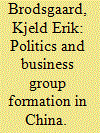

|
|
|
|
|
| Publication |
2012.
|
| Summary/Abstract |
As a result of economic reform and administrative restructuring in China, a number of powerful state-owned business groups ("national champions") have emerged within sectors of strategic importance. They are headed by a new corporate elite which enjoys unprecedentedly high levels of remuneration and managerial independence from government agencies and which derives legitimacy from symbolizing China's economic rise. However, through the nomenklatura system, the Party controls the appointment of the CEOs and presidents of the most important of these enterprises and manages a cadre transfer system which makes it possible to transfer/rotate business leaders to take up positions in state and Party agencies. In order to conceptualize the coexistence of the contradicting forces for further enterprise autonomy and continued central control that characterizes the evolving relationship between business groups and the Party-state, this paper proposes the notion of integrated fragmentation.
|
|
|
|
|
|
|
|
|
|
|
|
|
|
|
|
| 10 |
ID:
190159
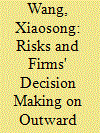

|
|
|
|
|
| Summary/Abstract |
This study explored how the risks encountered by Chinese state-owned enterprises (SOEs) affected their decision-making on outward foreign direct investment (OFDI), using data regarding the relationship between the host countries and China. The following conclusions were drawn. Larger SOEs with fixed capital exhibited a higher probability of conducting OFDI and did so on a larger scale. Various risks in host countries significantly hindered the OFDI of Chinese SOEs. In pursuit of natural resources, Chinese SOEs chose to take risks. The amount of OFDI by SOEs was positively related to the political, economic, and geographical relations between China and the corresponding host country.
|
|
|
|
|
|
|
|
|
|
|
|
|
|
|
|
| 11 |
ID:
101200


|
|
|
|
|
| Publication |
2010.
|
| Summary/Abstract |
The growth and transformation of state-owned enterprises (SOEs) in a changing socialist China has long been a popular focus of scholarly attention.Relatively little has been done to explain the growth dynamics and regional variation of China's SOEs. This paper investigates the spatial variation of China's SOEs through a comparative analysis of SOEs in northeast and southChina. A detailed comparison of SOEs in the machinery industry sector located in Shenyang in the northeast and Guangzhou in the south has revealed an interesting pattern inwhich SOEs in the two locations were positioned in different production environments characterized by different norms of market competition and different types of political ties with the central state. The non-price norm of market competition and a political commitment to a state strategy of key equipment indigenization have provided incentives for SOEs in Shenyang to adopt a technically-oriented and independent-brand-based growth strategy in their direct engagements with transnational corporations, and these engagements have caused them to pursue the rapid expansion of production capacity and sales income at the expense of capital efficiency and external economies. In contrast, the pressures ofmarket competition plus hardened budget constraints enforced by local governments has forced SOEs in Guangzhou to fall back on externally malleable production linkages and inter-firm networks, which have enabled them to adapt to emerging markets during the economic transition. While SOEs in the two locations share the same public property rights arrangements and operate in the same industrial sector, they are actually "different dreams" within the "same bed."
|
|
|
|
|
|
|
|
|
|
|
|
|
|
|
|
|
|
|
|
|